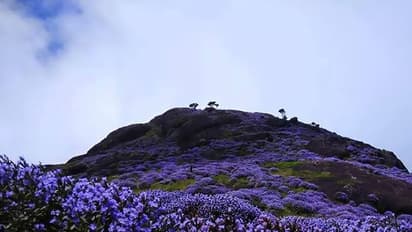8 lakh tourists expected as Munnar gears up for neelakurinji season

Synopsis
Neelakurinji, 'strobilanthes kunthiana' in scientific parlance, is a purplish blue flower which blooms only once every 12 years in Munnar The next blooming season of neelakurinji is expected during July-October 2018r and eight lakh tourists are expected to arrive at the tourist town Roads would be repaired, more sanitation facilities would be constructed and street vendors would be regulated, CM Pinarayi Vijayan said
With hill town Munnar gearing up for another blooming season of 'neelakurinji,' the Kerala government is planning elaborate arrangements for tourists flocking to the high range to have a glimpse of the rare flower.
Neelakurinji, known as 'strobilanthes kunthiana' in scientific parlance, is a purplish blue flower which blooms only once every 12 years in Idukki district's Munnar.
The next blooming season of neelakurinji is expected during July-October 2018 and at least eight lakh tourists are expected to arrive at the tourist town during the four months, Chief Minister Pinarayi Vijayan said in a Facebook post.
The blossoming of the beautiful flowers in Munnar, located in the biodiversity hotspot of Western Ghats, used to attract a large number of tourists and nature enthusiasts from and outside the state.
The Chief Minister said a high-level meeting decided to carry out adequate preparations and precautionary measures to accommodate tourists and protect Eravikulam National Park, a major neelakurinji hotspot located eight kms away from Munnar town. The meeting also decided to carry out a study to assess the capacity of the hill town and implement regulations based on this.
"The government is getting ready to provide better facilities for tourists and also take adequate precautionary measures to protect the National Park," the CM said.
Seeking to keep the place plastic-free, strict measures would be taken to ban plastic bottles and carry bags. Roads would be repaired, more sanitation facilities would be constructed and street vendors would be regulated considering the tourists turn out.
National Transportation Planning and Research Centre (NATPAC) would be entrusted with a study on the expected inflow of tourists vehicles during the period, Pinarayi said, adding that more buses would be deployed to transport holidayers to Ervikulam park.
Coordination committees would be formed at state and district levels, comprising officials of various departments, for the timely completion of the arrangements, the Chief Minister added.
(With PTI inputs)
Stay updated with the Breaking News Today and Latest News from across India and around the world. Get real-time updates, in-depth analysis, and comprehensive coverage of India News, World News, Indian Defence News, Kerala News, and Karnataka News. From politics to current affairs, follow every major story as it unfolds. Download the Asianet News Official App to stay informed anytime, anywhere.